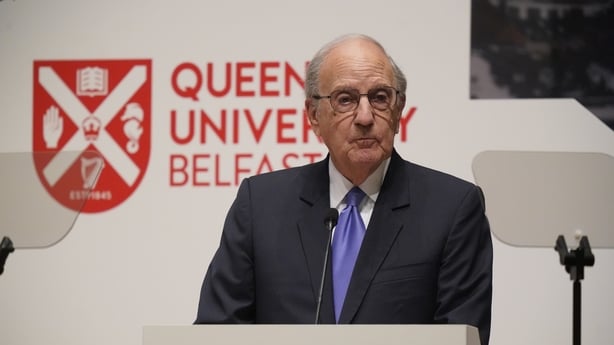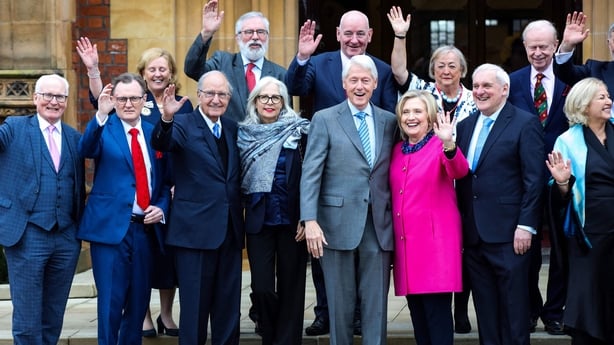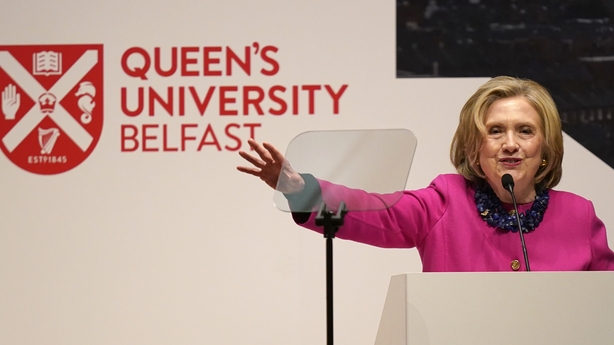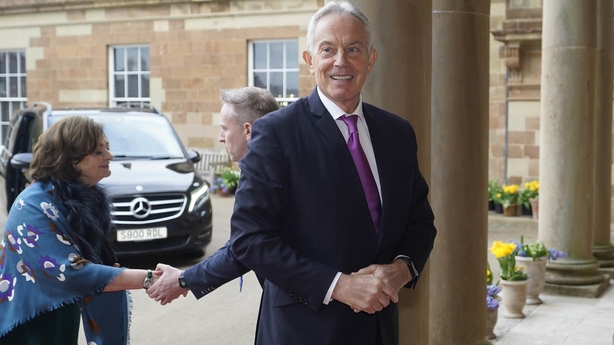Political parties in Northern Ireland should reach for compromise to resolve the current Stormont impasse, the man who chaired the Good Friday Agreement negotiations has said.
Former US senator George Mitchell urged leaders to act with the "courage and wisdom" that their predecessors had done 25 years ago.
Mr Mitchell was delivering the keynote speech on the first morning of the Agreement 25 conference at Queen's University in Belfast, marking the anniversary of the deal which largely ended the Troubles in Northern Ireland.
He said: "Today, a quarter century after the agreement, the people of Northern Ireland continue to wrestle with their doubts, their differences, their disagreements.

"They will continue to do so no matter how successful their political leaders are.
"The answer is not perfection or permanence, it is now, as it was then, for the current and future leaders of Northern Ireland to act with courage and vision as their predecessors did 25 years ago.
"To find workable answers to the daily problems of the present, to preserve peace.
"To leave to the next generation peace, freedom, opportunity and the hope of a better future for their children."
The Stormont power-sharing institutions, the main element of the 1998 deal, are currently not operating due to disagreements over post-Brexit trading arrangements.
"We need people who believe, who know, that the possible does exist within the impossible. Don't let it slip away."
Mr Mitchell said: "I know that each of your parties - like all political parties in the world - have some of what I call the 100 percenters, they want everything their way all the time - to them, any compromise is a sign of weakness," he said.
"I say to you that reasoned, principled compromise is essential, especially in divided societies. It reflects a belief in democratic values that we all are in this together.
"There is great depth in recognising that the only way to help us emerge from the rubble of conflict is that we must learn to understand one another. We don't need to love one another.
"We don't even need to like one another, although we hope we could. But we must learn to understand one another and to be able to say yes to one another, especially when the quicker and easier answer is no.
Some of the key architects of Good Friday Agreement gather for photo call to mark 25th anniversary @rtenews pic.twitter.com/pmoUJezZYO
— Vincent Kearney (@vincekearney) April 17, 2023
"Because, like it or not, we are all in this together, facing the reality of the future, rather than clinging to the myths of the past, takes strength and courage, and vision.
"Those we honour today showed those qualities a quarter of a century ago, they will be forever remembered."
Mr Mitchell said it was "unmistakably clear" that the people of Northern Ireland did not want violence to return.
During his speech, he asked the audience to observe a moment of silence in tribute to the victims of the Troubles.
He also asked them to applaud for the politicians who struck the agreement 25 years ago.
"I say now to the current and future leaders of Northern Ireland, there is much in your history and in your politics that divide you, but there also is much that can bring you together, that can inspire you to continue what your predecessors began a quarter century ago," he said.
"It is not a sign of weakness to resolve your differences by democratic and peaceful means. To the contrary, it is a sign of strength and of wisdom, and it clearly reflects the will of the overwhelming majority of the people of Northern Ireland.
"Yes, they often disagree, sometimes very strongly.
"Yes, they may take offence quickly. But it is unmistakably clear that the people of Northern Ireland do not want to return to violence, not now and not ever."
"We need people who believe, who know, that the possible does exist within the impossible. Don't let it slip away."
A bust of Mr Mitchell has been unveiled in the grounds of the university this afternoon.
Bill and Hillary Clinton, Tony Blair, Bertie Ahern and Northern Ireland Secretary Chris Heaton-Harris were among those who spoke at the event.

At the event, former US president Bill Clinton said political leaders "winged it" in terms of the Northern Ireland peace process.
Mr Clinton said under the pressure at that time, "some of your decisions will be wrong or will be questioned or will not be good for one of your partners on any given day".
"It just happens, nobody's perfect, you can't foresee all this, and the fact that we trusted each other and we trusted (George) Mitchell, I think we earned the trust of the parties in Northern Ireland that we were dealing with pretty across the board, because they thought we would be straight with them, and that's how it happened," he said.
"There were days I felt like I was taking Seamus Heaney's advice to take a flying leap and walk on air against your better judgment. That's how it started. We all just decided that the time was right to do the right thing."
He said people thought they were crazy to believe they could get the paramilitary groups to decommission their arms.
"We'd like to tell you that we had it all thought through but the truth is we made up a lot of it as we went along, we had to wing it," he said. "And then when (George) Mitchell came in, he organised our efforts."
Hillary Clinton calls Good Friday Agreement a 'triumph of diplomacy'
Earlier, former US Secretary of State Hillary Clinton called the Good Friday Agreement a testament to the "triumph of diplomacy".
Mrs Clinton said: "On the 25th anniversary of the Good Friday Agreement, I think we can all agree to celebrate a significant milestone with both a sense of accomplishment, but also with hope and determination that the next 25 years will bring more fully the peace, prosperity and safety the agreement promised.

"There can be no doubt that people in Northern Ireland enjoy safety and security, much more than those who had lived through the previous decades, that they could only have dreamed of.
"The longevity of the Good Friday Agreement remains a true triumph of diplomacy and a testament to democracy's power to transcend divisions and deliver peace.
"It is primarily a testament to a lot of tough, determined everyday people who refused to go back to the days of division and violence."
Former US president Bill Clinton, former taoiseach Bertie Ahern and former British prime minister Tony Blair and other political leaders from Northern Ireland's peace process era will take part in the event.
Former US President Bill Clinton arrives at Queen's University in Belfast for conference to mark 25th anniversary of Good Friday Agreement @rtenews pic.twitter.com/UxxNTipQUY
— Vincent Kearney (@vincekearney) April 17, 2023
Mrs Clinton added that the ongoing exodus of Northern Ireland's young people to study and work elsewhere demonstrated the need to restore power-sharing.
"One of the driving reasons to resume the government, to get about the business of governing, is that right now 33% of school leavers in Northern Ireland leave to seek their futures elsewhere, taking with them their skills, their education, their ambitions, their dreams," she said.
"The ongoing struggle to finish the Good Friday Agreement and claim its full promise is a reminder of one of the things I try to remember in my life when I've been really high or really low - there are no final victories or defeats in life.
"The most important thing is to fight the right fight and to keep doing it the best you can for as long as you can."
Other contributors include former president Mary McAleese, former deputy White House national security advisor Nancy Soderberg and a number of Northern Ireland politicians who were involved in the negotiations.
Taoiseach Leo Varadkar and British Prime Minister Rishi Sunak will also share a platform at the event later in the week.
Joseph Kennedy III, the US Special Economic Envoy to Northern Ireland, will also speak.
Peace needs continuous work - Blair
Mr Blair has said the institutions of the Good Friday Agreement need to be continually worked to secure them for the future.
"I think there has been a huge amount of gain and there are people alive today who otherwise wouldn't be," he told the BBC Good Morning Ulster programme.
"But I am the first to say it takes a long time for the mistrust to disappear, for the institutional arrangements to make full sense to people, and you've got to work at it the whole time."
He added: "When you look back over this 25 years, from time to time we have had that same energy, from time to time we haven't.
"But you've got to keep it and you've got to work at it all the time if you want it to be secure for the future."

Mr Ahern said barriers were broken down to secure the Good Friday Agreement in 1998.
He told the BBC: "We had the right mix of people and because we were at it night and day for eight or nine months, if not for a number of years before that.
"We knew this wasn't going to be perfect, but there was a feeling with the help of the European Union, with the help of Bill Clinton and the Americans, the fact that all the parties were getting on reasonably well, we had broken down the barriers."
Mr Ahern said it was disappointing that US President Joe Biden was unable to address the Stormont Assembly during his visit to Northern Ireland last week.
He said: "Yeah, no doubt about it, that would have been a great thing around the world.
"That would have been a really, really powerful shot and position and speech from Stormont and unfortunately that didn't happen.
"Anyone who comes in and says they don't regret that isn't telling the truth."
Northern Ireland Secretary Chris Heaton-Harris has said the conference provides a great opportunity to reflect on the achievements of the agreement.
"This forum will provide an opportunity for the architects of the agreement and those benefitting from Northern Ireland it helped to create, to discuss progressing peace and prosperity," he said.
Several events took place over the weekend ahead of the start of the conference.
Yesterday evening, a special dinner was held at Hillsborough Castle to mark the contribution to the peace process by the late Mo Mowlam, who was Northern Ireland secretary in 1998.
Additional reporting: Conor MacCauley, Vincent Kearney

